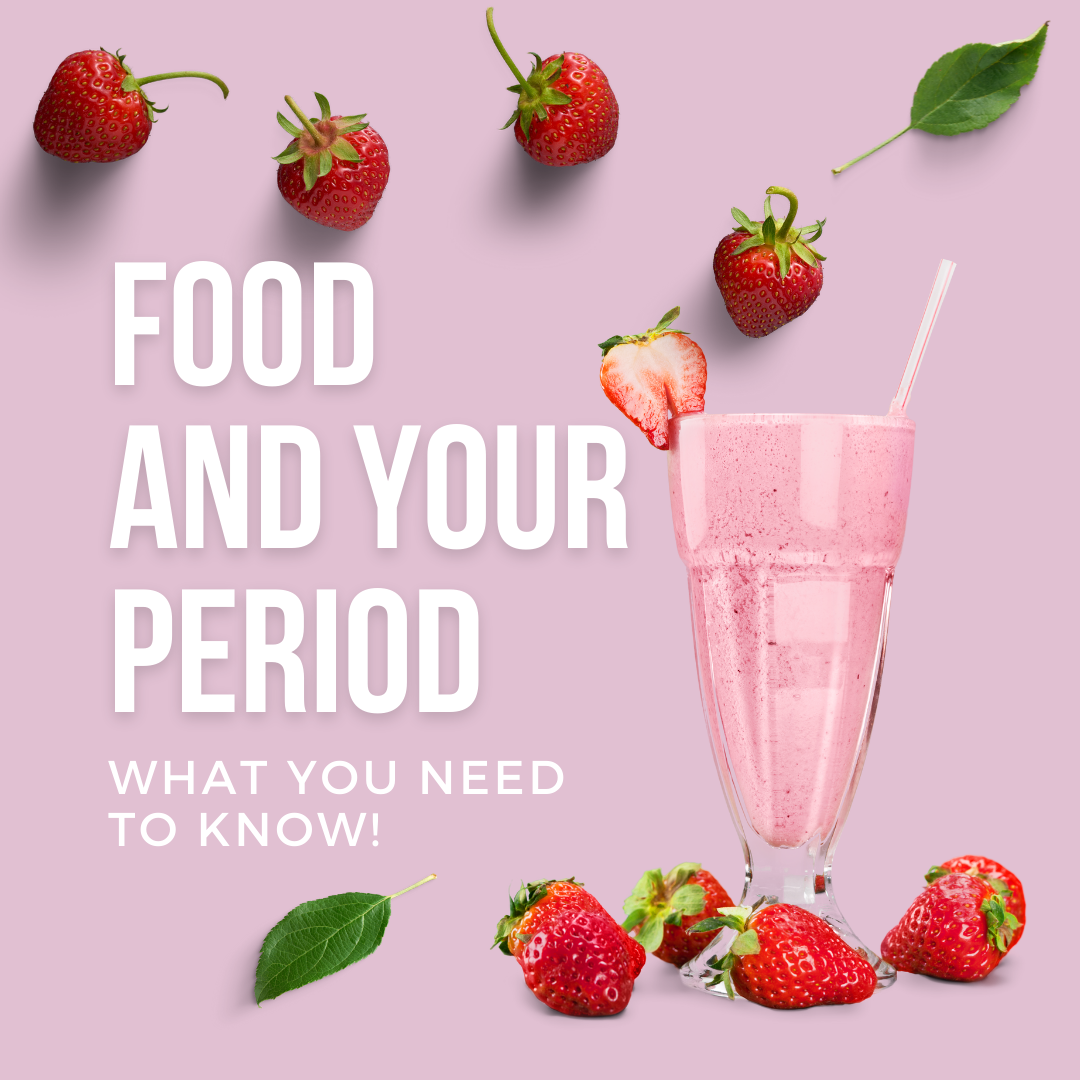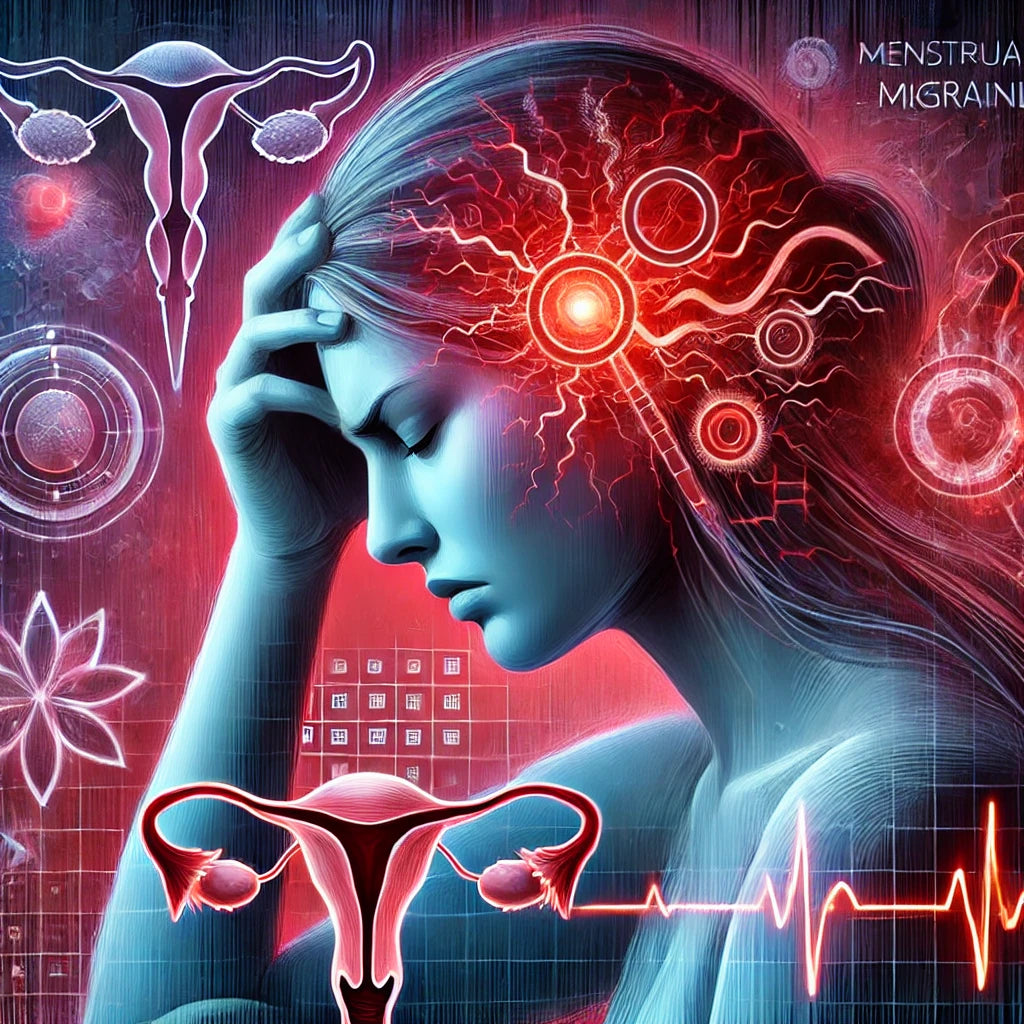
Why Food and Your Period Are Crucial to Your Health and Menstrual Cycle
When it comes to maintaining overall health, we often hear the importance of eating well, exercising, and managing stress. However, one aspect that doesn't always get as much attention is the powerful connection between your diet and your menstrual cycle. From regulating hormones to alleviating cramps, the food you consume can have a profound impact on your period and reproductive health.
In this blog post, we'll explore why the foods you eat matter to your menstrual cycle, and how certain nutrients can support your body through the different phases of your cycle.
The Phases of Your Menstrual Cycle
Before diving into how food affects your period, it's important to understand the different phases of your menstrual cycle. A typical cycle lasts around 28 days and can be divided into four main phases:
- Menstrual Phase (Days 1-5): This is when you have your period, and the lining of your uterus is shed.
- Follicular Phase (Days 6-14): The body prepares for ovulation, and estrogen levels rise.
- Ovulation (Around Day 14): An egg is released from the ovary, and your body is at its most fertile.
- Luteal Phase (Days 15-28): After ovulation, the body prepares for a potential pregnancy, and progesterone levels rise.
Each phase comes with its own hormonal fluctuations, which can affect your mood, energy levels, and physical well-being. What you eat can either support or hinder your body’s ability to stay balanced during each phase.
How Nutrition Impacts Your Menstrual Health
1. Regulating Hormones
Hormones like estrogen and progesterone control many aspects of your menstrual cycle, and a balanced diet plays a critical role in maintaining their proper levels. Nutrients such as healthy fats (omega-3 fatty acids), protein, and fiber are essential for hormone production and regulation.
For example:
- Omega-3 fatty acids, found in foods like salmon, chia seeds, and walnuts, can help reduce inflammation and support hormone balance.
- Magnesium (found in leafy greens, nuts, and seeds) plays a role in regulating estrogen and progesterone and can help alleviate PMS symptoms like bloating and irritability.
- Zinc, present in foods like pumpkin seeds and legumes, supports hormonal function and can help with symptoms of PCOS (Polycystic Ovary Syndrome).
2. Reducing Menstrual Pain (Dysmenorrhea)
Painful periods, or dysmenorrhea, are a common complaint among many people who menstruate. Inflammation in the body can make cramps worse, and diet can help reduce that inflammation.
- Anti-inflammatory foods like berries, tomatoes, fatty fish, and leafy greens can help reduce the level of prostaglandins (hormones that cause uterine contractions), which are often responsible for menstrual cramps.
- Turmeric and ginger are also natural anti-inflammatories that can ease cramps. Both can be consumed in food or as a warm tea.
- Additionally, foods rich in vitamin B6 (like bananas, potatoes, and chicken) can help ease mood swings and cramps during the luteal phase.
3. Managing PMS Symptoms
Premenstrual syndrome (PMS) affects many people in the days leading up to their period. Symptoms include mood swings, bloating, fatigue, and cravings. The good news is that proper nutrition can help mitigate these symptoms.
- Complex carbohydrates, like whole grains, legumes, and sweet potatoes, help stabilize blood sugar and prevent mood swings.
- Calcium and vitamin D are crucial during the luteal phase. They help with muscle relaxation and can alleviate mood swings and irritability. Dairy, fortified plant milks, and leafy greens are great sources of calcium.
- Hydration is essential. Water-rich foods, such as cucumbers and watermelon, and drinking plenty of water throughout the day can help reduce bloating and alleviate water retention, a common issue during PMS.
4. Supporting Fertility and Ovulation
If you're trying to conceive, nutrition plays a pivotal role in supporting fertility and healthy ovulation. Certain nutrients are particularly important during the follicular phase when your body is preparing for ovulation.
- Folic acid, found in leafy greens, lentils, and fortified cereals, is vital for cellular growth and healthy egg development.
- Vitamin E, found in almonds, sunflower seeds, and spinach, is important for reproductive health, as it helps to balance estrogen levels.
- Healthy fats are essential for hormone production, and ensuring that you get enough omega-3s, as mentioned earlier, can be especially helpful in supporting fertility.
5. Post-Period Recovery
Once your period ends and you move into the follicular phase, your body is primed to recover and build up nutrients for the next cycle. Eating a nutrient-dense diet during this phase can help your body replenish essential stores of vitamins and minerals.
- Focus on iron-rich foods like spinach, red meat, and legumes, as menstruation can deplete iron levels. This helps restore energy and prevent iron deficiency anemia, which can leave you feeling tired and sluggish.
- Vitamin C (found in citrus fruits, bell peppers, and strawberries) helps with iron absorption and supports your immune system.
How to Build a Cycle-Supportive Diet
-
Whole Foods: Prioritize whole, unprocessed foods that are rich in vitamins, minerals, fiber, and antioxidants. Aim for a balanced plate that includes a mix of vegetables, fruits, healthy fats, lean proteins, and complex carbohydrates.
-
Meal Timing: Eating regular, balanced meals throughout the day can help stabilize your blood sugar levels and prevent mood swings or cravings, especially during PMS and menstruation.
-
Herbs & Supplements: In addition to food, certain herbs and supplements like chamomile tea, vitex (chaste tree berry), and evening primrose oil may help support menstrual health, though it's always a good idea to consult with a healthcare provider before adding supplements.
Conclusion: Eat for Your Cycle, Not Against It
Your menstrual cycle isn’t just a monthly inconvenience—it’s a reflection of your overall health, and what you eat plays a crucial role in keeping everything running smoothly. By understanding how nutrition impacts your hormones and symptoms, you can make dietary choices that support your body throughout the different phases of your cycle.
From easing cramps to supporting fertility, food can be a powerful tool for optimizing menstrual health. So, next time you’re thinking about your diet, remember that your period is an important part of the equation—and feeding your body what it needs can make all the difference.
Take care of yourself, inside and out, and give your body the nutrients it needs to feel balanced and empowered throughout your menstrual cycle!



